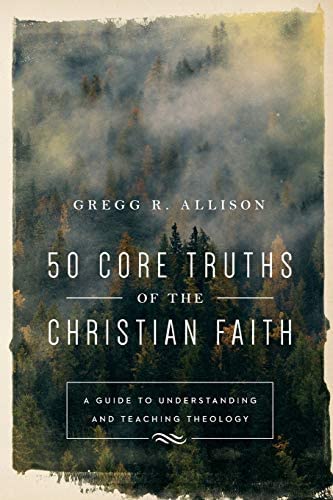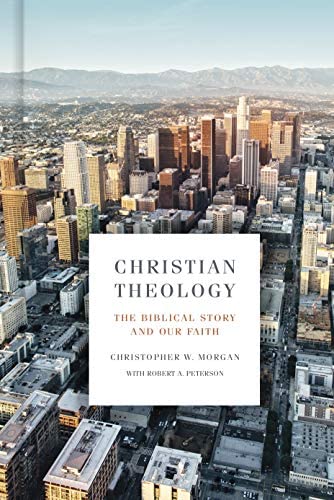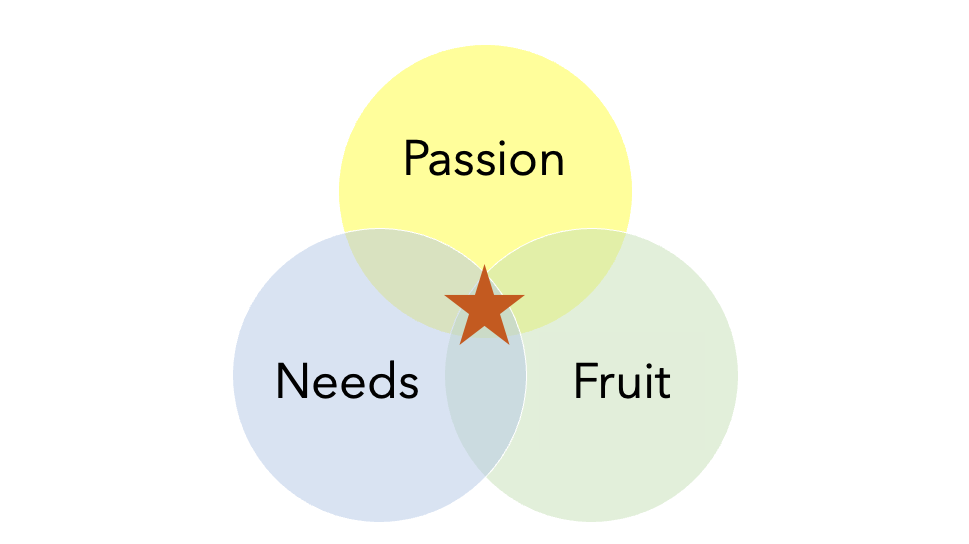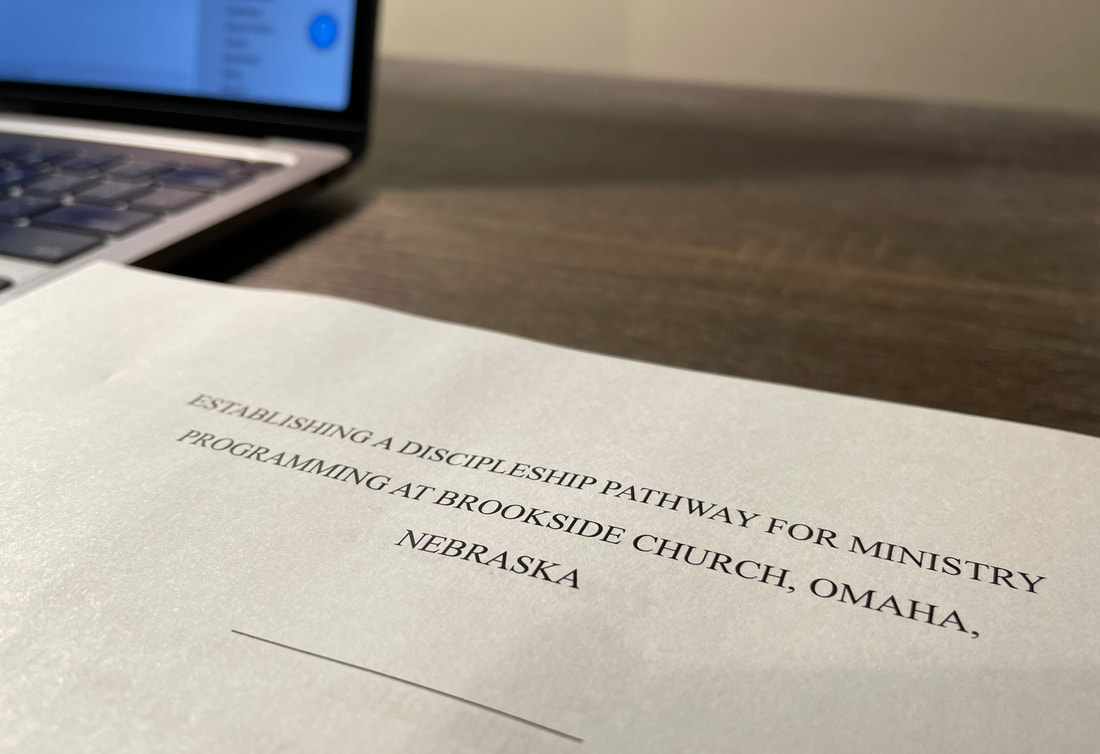|
Earlier this month I preached on Daniel 1 in Brookside Church's short series on Daniel. To see that fuller series, click here. A number of people have asked that I make this sermon accessible a bit more broadly (beyond Brookside's website and YouTube channel — both great places by the way!) With that request in mind, see below for my sermon on Daniel 1 preached on June 9, 2024. I have included the following formats below:
Sermon Video (Length: 38:37)Sermon Audio (Length: 38:37)Sermon Manuscript Your browser does not support viewing this document. Click here to download the document. Skeleton Outline of SermonI. Introduction II. Body A. The realities of exile (Daniel 1:1-7) B. The response in exile (Daniel 1:8-14) 1. Conviction 2. Character C. The triumph over exile (Daniel 1:15-21) 1. Daniel and friends pass the test and grow in influence 2. The presence of God "behind the scenes" (some form of "God gave..." in vv. 2, 9, 17) 3. Nebuchadnezzars disappears. Daniel remains. (v. 21) 4. Jesus' triumph over exile III. Conclusion
0 Comments
One of our core values at Brookside Church is Biblical Authority — looking to the Bible for truth, direction, and inspiration. On Sunday mornings we preach from the Bible. Our small groups (all ages) are tethered to God's Word. We have been encouraging personal Bible reading for YEARS through our 365 Bible Reading Plan. The bottom line? We believe the Bible is uniquely authoritative as God's Word, and useful for teaching, rebuking, correcting, and training for right living (see 2 Timothy 3:16-17). But we don't only care THAT people read God's Word. (Though of course we never want to minimize this either!) We also care HOW people read God's Word. Or stated another way, we want to help people get into the Bible in such a way that they get the most out of the Bible (in a way that is consistent with how the Bible itself wants to be read!). Our goal is that our teaching models this and certain classes we offer facilitate this (think: Bible Basics). And we also want to point people toward helpful resources that contribute to this goal as well. With that in mind, here are six resources I encourage others toward, when I hear they want help with understanding how to read the Bible on their own, or with interpreting certain kinds of Scripture, etc. I hope these help you get into God's Word, in such a way that God's Word gets into you! (Note: These are listed in no particular order. [Other than the Study Bibles at the beginning — start there if you don't have a study Bible yet.] Choose the one or two of these that you find more interesting, and dig in!)
You may also be interested in...
Building a Biblical and Theological Library? Here Are (Another) 4 More Books to Add to the Shelves1/17/2023 In the past I've written a couple of short posts advocating the idea of building a biblical and theological "library" of books — a shelf (or shelves) with trusted books that can relied on to guide you in reading the Bible and navigating theological topics. (Click here and here to see the first two posts in what is now apparently a series!) Some of these are books to read straight through; others are books to keep handy as reference books and turn to on an as-needed basis. All of them are worthwhile. I'm still a fan of the books I recommended in the earlier posts — even as I now figure it's time to add a few more books to the list. If you're looking to slowly start building (or adding) to a biblical and theological library yourself, here are four books to add to the shelf: You may also be interested in...In Matthew 25:14-30, Jesus shares a parable often called "The Parable of the Talents" or "The Parable of the Bags of Gold." In this parable, the master of an estate entrusts three of his servants with bags of gold while he goes away on a journey. It is clear from this parable that this money is the master's, and as his servants these three men are to steward the money in a way that honors the master.
After a long time (v. 19) the master returns, and his servants report back to him. The first two servants are commended: "Well done, good and faithful servant." They're invited to share the master's happiness and will continue to contribute meaningfully (vv. 21, 23). The third servant, however, is both wicked and lazy (v. 26). He hasn't added to his master's wealth at all. It's likely that the "spending power" of the bag of gold with which he is entrusted is actually less, given that the master was gone "a long time" (v. 19) and the realities of inflating costs. The third servant did nothing with this money that would even add interest to it. This third servant, then, is then excluded from the master's joyful presence and assigned to a place of "darkness, where there will be weeping and gnashing of teeth" (v. 30). There's obviously a lot that can be said about this parable. I want to focus our attention here on the clear point of the parable: we're to be faithful servants with what we've been given. (If you want to hear a full 40 minute sermon I've given on this passage, click here.) And that means the next right question is this: What drivers motivate my faithfulness? How can I anticipate with confidence hearing these words from Jesus someday, "Well done, good and faithful servant"? Here are four drivers — straight from this parable — that can help us anticipate hearing these words from Jesus ourselves. The New Testament provides four passages that focus in on the "spiritual gifts" — divinely given gifts that "enable us to 'do the work of ministry, to build up the body of Christ, to reach unity in the faith and in the knowledge of God's Son'"; gifts given so that you might "fulfill your unique calling within the body of Christ" (Dan Darling, Spiritual Gifts: What They Are and How to Use Them, p. 15).
These four passages that focus on the spiritual gifts in a special way are Romans 12:3-8; 1 Corinthians 12:4-31 (the whole context of 1 Corinthians 12-14 is important!); Ephesians 4:7-16; 1 Peter 4:10-11. A lot can be said about the spiritual gifts, and a lot has been said about the spiritual gifts. (For a deeper dive into this topic, see the "Recommended Resources" further down in this post.) My purpose with this short post is simply to orient you the "HOW?" question — how can you zero in on identifying and leveraging the unique gifts God has given you? This post certainly isn't the only word or the last word on the subject — but I'm hoping it can contribute in practical ways to something every follower of Jesus should have on his or her radar screen. Project accomplished!
Over the last two-and-a-half years, I have been chipping away at a Doctor of Ministry (DMin) in Applied Theology from The Southern Baptist Theological Seminary in Louisville, KY. I've loved the process (though it's been work for sure!), and am excited to be at this point where my final project has been defended, accepted, and successfully published — and now I'm just awaiting graduation in December. I'm excited to see how God might use this in and for the local church, as I seek to steward this education faithfully and for the advance of God's work. I'm getting questions about my doctoral project / dissertation, and so figured I'd provide a few snapshots of my work here. The title of my project is "Establishing a Discipleship Pathway for Ministry Programming at Brookside Church, Omaha, Nebraska." The "really short version" is that I've been working on how local churches as the local church can make disciples in obedience to Jesus' command in Matthew 28:19-20. My research focused on painting a clear PICTURE of discipleship from the Gospel of Matthew and the early chapters in Acts. Then I moved into constructing a concrete PATHWAY for discipleship that local churches can benefit from and apply practically. It's been fun already to "translate" this into two courses (both five sessions) I've been able to teach at Brookside — one specifically designed for ministry leaders, and another for the broader congregation. Below I've included PDF snapshots of the (1) Table of Contents and (2) abstract where the work is summarized further. In John 15, Jesus draws on vivid imagery to describe the life He offers, and the life His followers find in Him. John 15:5 perhaps sums it up most clearly: "I am the vine; you are the branches. I you remain in me and I in you, you will bear much fruit. Apart from me you can do nothing."
The take-away is clear. As His followers, we need to stay connected to Jesus. He's our life, and only through Him we bear fruit. As I've been meditating on this verse, however, I wonder if too often I can approach Jesus more as a gas pump than a vine. But what does that mean? And why is it dangerous? Who is the Holy Spirit? He's been called "the forgotten God" and "the shy member of the Trinity." My guess is, even many Christians would acknowledge they don't know a lot about the Holy Spirit.
And then there are some truths about the Spirit's work that we won't know and can't quantify - at one level, there will always remain some mystery surrounding the Spirit's activity. Even Jesus seems to teach this in a passage like John 3:8: "The wind blows wherever it pleases. You heard the sound, but you cannot tell where it comes from or where it is going. So it is with everyone born of the Spirit." None of this, though, should keep us from pressing into Scripture and discovering what we can about the Holy Spirit. Joshua 1:8 is a clinic on how to approach God's Word well. Keep this Book of the Law always on your lips; meditate on it day and night, so that you may be careful to do everything written in it. Then you will be prosperous and successful. The take-aways are clear. God's Word should be on our lips.We speak it. This doesn’t mean that we follow every sentence with a verse reference; it means we are so full of the truth in this Book that it naturally influences and spills out in what we say! God's Word should be in our hearts.We meditate on it. We reflect on it and sit in the truths we encounter in the Bible. The story of the Bible forms us. The best picture I have for biblical meditation is marinading meat - think "chicken" or "steak". When meat soaks in a marinade and that’s done well, that marinade will permeate the meat so that when you take a bite, you can’t taste the meat without getting a hint of the marinade. That’s what mediating on the Bible means: God’s Word has so permeated our hearts - we’ve soaked in it so deeply - that every part of us has the taste of God and His Word. God's Word transforms our actions.We apply it. As much of a fan as I am for knowing the Bible, we never want to JUST know the Bible. This Book isn’t just about information; it's about transformation. When you put all this together, here’s what this means: We need to fight for the priority of God’s Word in our daily lives. There’s so much pressure to keep up with the latest news cycle and there are so many distractions with media and entertainment and busyness. My concern is we’re getting so consumed by these things that we’re neglecting the priority of God’s Word and the story it invites us into. Keep spending time in this book! Slowly, repeatedly, day by day over the course of weeks and months and years. This is God’s Word to us - that’s how valuable it is, and how much we need it! You may also be interested in...What does it look like to grow in knowing, loving, and obeying the message of the Bible? Here are three tips I try and live by myself, and three tips I’d recommend to anyone wanting to engage the Bible well. (For those of you that can appreciate some alliteration, watch out for the R’s. 😀)
|
Tim WiebeChristian. Husband. Father. Pastor. Learner. Contributor. Reader. Categories
All
Archives
June 2024
|
© 2014-2024 | 11607 M Circle, Omaha NE, 68137 | www.thebrooksideinstitute.net



















 RSS Feed
RSS Feed
